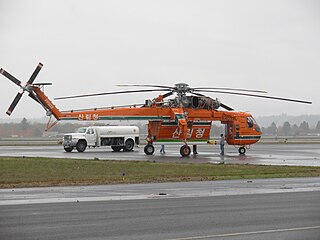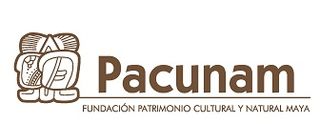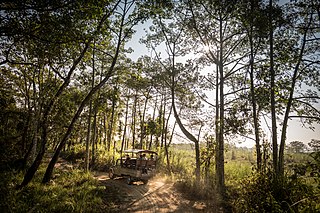Development communication refers to the use of communication to facilitate social development. Development communication engages stakeholders and policy makers, establishes conducive environments, assesses risks and opportunities and promotes information exchanges to create positive social change via sustainable development. Development communication techniques include information dissemination and education, behavior change, social marketing, social mobilization, media advocacy, communication for social change, and community participation.

The Center for International Forestry Research (CIFOR) is a non-profit scientific research organization that conducts research on the use and management of forests with a focus on tropical forests in developing countries. CIFOR is the forestry research center of the Consultative Group on International Agricultural Research (CGIAR), a network of 15 research centers around the world that focus on agricultural research for sustainable development, working closely with governments and other partners to help develop evidence-based solutions to problems related to sustainable agriculture and natural resource management.
Adaptive management (AM), also known as adaptive resource management (ARM) or adaptive environmental assessment and management (AEAM), is a structured, iterative process of robust decision making in the face of uncertainty, with an aim to reducing uncertainty over time via system monitoring. In this way, decision making simultaneously meets one or more resource management objectives and, either passively or actively, accrues information needed to improve future management. Adaptive management is a tool which should be used not only to change a system, but also to learn about the system. Because adaptive management is based on a learning process, it improves long-run management outcomes. The challenge in using the adaptive management approach lies in finding the correct balance between gaining knowledge to improve management in the future and achieving the best short-term outcome based on current knowledge. This approach has more recently been employed in implementing international development programs.

University Putra Malaysia is recognised by the independent government assessments as one of Malaysia's leading research universities offering undergraduate and postgraduate courses with a focus on agricultural sciences and its related fields.

Capacity building is the process by which individuals and organizations obtain, improve, and retain the skills, knowledge, tools, equipment, and other resources needed to do their jobs competently. It allows individuals and organizations to perform at a greater capacity. "Capacity building" and "Capacity development" are often used interchangeably. This term indexes a series of initiatives from the 1950s in which the active participation of local communities’ members in social and economic development was encouraged via national and subnational plans.

The Korea Forest Service is charged with maintaining South Korea's forest lands. It is an independent agency specializing in forestry that is overseen by the Ministry for Food, Agriculture, Forestry and Fisheries. The current minister is Mr. Kim Jae-Hyun. The headquarters of the agency is located at the Daejeon Government Complex.
Sustainable forest management is the management of forests according to the principles of sustainable development. Sustainable forest management has to keep the balance between three main pillars: ecological, economic and socio-cultural. Successfully achieving sustainable forest management will provide integrated benefits to all, ranging from safeguarding local livelihoods to protecting the biodiversity and ecosystems provided by forests, reducing rural poverty and mitigating some of the effects of climate change.

The International Union of Forest Research Organizations (IUFRO) is a non-profit, non-governmental international network of forest scientists, headquartered in Austria. The organization unites over 15,000 scientists in about 700 Member Organizations from more than 127 countries.

The United Nations Forum on Forests (UNFF) is a high-level intergovernmental policy forum. The forum includes all United Nations Member States and Permanent Observers, the UNFF Secretariat, the Collaborative Partnership on Forests, Regional Organizations and Processes and Major Groups.

Cambodia is one of the world's most forest endowed countries that has not yet been drastically deforested. However, massive deforestation for economic development threatens its forests and ecosystems. As of 2015, the country has one of the highest rates of deforestation in the world.
Environmental adult education is recognized as a "hybrid outgrowth of the environmental movement and adult education, combining an ecological orientation with a learning paradigm to provide a vigorous educational approach to environmental concerns."
International Forestry Students’ Association or IFSA is a non-political, not for profit organisation of tertiary-level forestry students around the world. Approximately 10,000 forestry and related forest science students are either directly or indirectly represented, with about 120 Local Committees in over 50 countries.

Deforestation is one of the most serious environmental issues in Sri Lanka. In the 1920s, the island had a 49 percent forest cover but by 2005 this had fallen by approximately 26 percent. Between 1990 and 2000, Sri Lanka lost an average of 26,800 ha of forests per year. This amounts to an average annual deforestation rate of 1.14%. Between 2000 and 2005 the rate accelerated to 1.43% per annum. However, with a long history of policy and laws towards environmental protection, deforestation rates of primary cover have actually decreased 35% since the end of the 1990s thanks to a strong history of conservation measures. The problem of deforestation in Sri Lanka is not as significant in the southern mountainous regions as it is in northern and lowland southern Sri Lanka, largely due to the nature of environmental protection.

Community forestry is an evolving branch of forestry whereby the local community plays a significant role in forest management and land use decision making by themselves in the facilitating support of government as well as change agents. It involves the participation and collaboration of various stakeholders including community, government and non-governmental organisations (NGOs). The level of involvement of each of these groups is dependent on the specific community forest project, the management system in use and the region. It gained prominence in the mid-1970s and examples of community forestry can now be seen in many countries including Nepal, Indonesia, Korea, Brazil, India and North America.
The World Forestry Congress (WFC) is the largest and most significant gathering of the world's forestry sector and it has been held every six years since 1926 under the auspices of the Food and Agriculture Organization of the United Nations (FAO), organized by the government of the host country. It is a forum for the sharing of knowledge and experience regarding the conservation, management and use of the world's forests, and covers such issues as international dialogue, socio-economic and institutional aspects, and forest policies.
A sustainability organization is (1) an organized group of people that aims to advance sustainability and/or (2) those actions of organizing something sustainably. Unlike many business organizations, sustainability organizations are not limited to implementing sustainability strategies which provide them with economic and cultural benefits attained through environmental responsibility. For sustainability organizations, sustainability can also be an end in itself without further justifications.
Community-based forest management (CBFM) constitutes “a powerful paradigm that evolved out of the failure of state forest governance to ensure the sustainability of forest resources and the equitable distribution of access to and benefits from them”. In 1995, the Philippine government adopted CBFM as a national scheme to promote sustainable forest governance, in recognition of the negative impacts occurring as a result of widespread forest loss across the country. The scheme stresses the importance of involving communities in sustaining the forest through projects such as timber harvesting, agro-forestry and livestock raising. CBFM therefore advocates an increasingly ‘bottom up’ – as opposed to the historically ‘top down’ and centralised - approach to sustainable forest governance involving a variety of stakeholders. By 2005, 5503 projects had been established across the country. For this reason the Philippines has been considered a pioneer within Asia for the successful implementation of CBFM as a nationwide tool of forest governance.
The Montréal Process, officially known as the Montréal Process Working Group on Criteria and Indicators for the Conservation and Sustainable Management of Temperate and Boreal Forests, is a voluntary agreement on sustainable forest management. It was formed in Geneva, Switzerland in June 1994 as a result of the Forest Principles developed at the 1992 Earth Summit.

The Foundation for Maya Cultural and Natural Heritage (PACUNAM) is an organization of visionary corporations committed to the preservation of Guatemala's natural and cultural heritage through sustainable development for the benefit of future generations. One of PACUNAM´s priorities is the conservation of the Maya Biosphere Reserve.

The community forestry program in Nepal is a government effort to reduce forest degradation and to promote sustainable forestry practices as well as to improve the livelihood of the community. It incorporates distinct policies, institutions and practices. The two main goals of the community forestry program is to empower local communities whilst encouraging environmental conservation benefits on the Himalayan forests.










